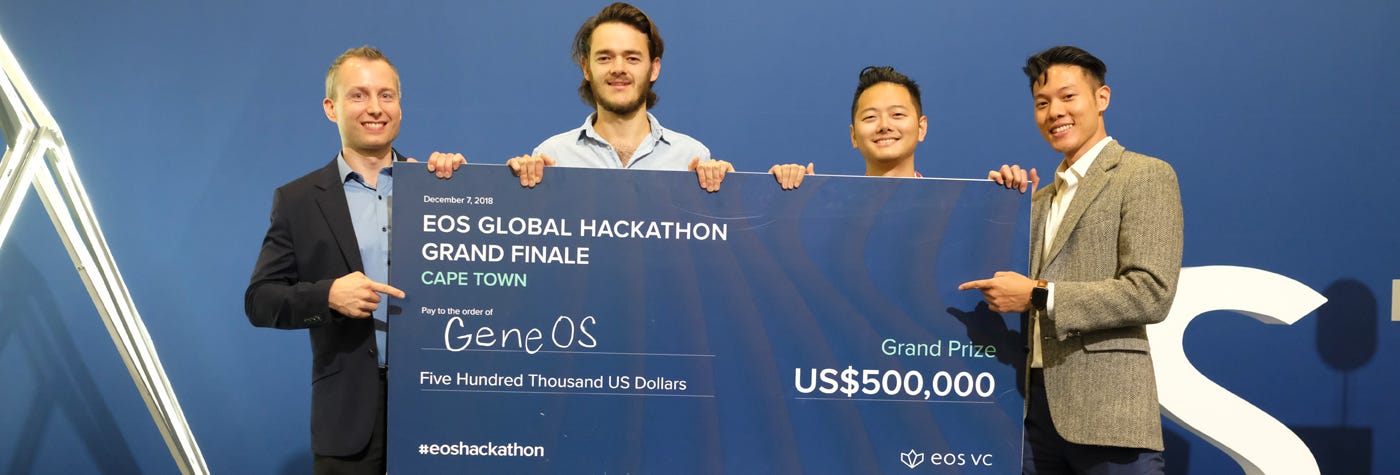译文/Translated:

经验丰富的企业家团队正在建立一个激励平台,促进DNA数据共享来抗击疾病
GeneOS四个创始人—Benjamin Tse, Jens Elstner, Albert Chen and Jay Bowles —的故事可能是你会在自己最爱乐队的传记中读到的。他们基于区块链的基因组大数据平台一步步斩获Block.one EOS全球黑客马拉松比赛、获得50万美金奖金的过程中,友谊、命运和协作都扮演者重要的角色。
2013年,Jay 和Jens共同在伦敦建立了管理接口和分析应用程序商店Keepzer。同时期,2011年,Albert和Ben在香港创立了UM! Brands,一个“电子商务纳米家庭用品品牌”,他俩还是加州加密资产管理公司Arcana的创始合伙人。Albert和Jay也是朋友,但是,他们在9月初的一场黑客马拉松中是竞争对手。当他们知道Block.one的EOS黑客马拉松当月要在伦敦举办预赛,他们停止竞争,组成了他们的黑客马拉松全明星团队。
“对我来说这跟做梦一样,”GeneOS在南非开普敦的EOS全球黑客马拉松为期一周的决赛高潮中斩获头奖之后,Jens这么说道。“我们以前合作过各种事宜,但是我们的联系同来没有特别紧密过。我一直希望能用区块链多做一些实事,所以这对我们来说是一个很好的机会。”
Benjamin补充说:“我们在伦敦能够合作得这么好真的是出乎我的意料,毕竟我也是第一次和Jens和Jay在现实中见面。Albert倒是和我合作了很多年,他们俩(Jay和Jens)也自己合作了很多年,但是我们的配合就是这么融洽,这还真的是不可思议。”
结合了他们在科技、工程、设计、营销和其它各类的专业知识之后,这四个人在英国的比赛中提出了GeneOS的想法。
Albert解释了这个项目的基本原理和操作模式。“99%的DNA没有被人们理解,所以我们的目标是帮助人类了解DNA从而治愈疾病。但第一个问题是人们没能被鼓励做基因组测试——测试太贵了,同时人们对数据的私密性也有担忧。我们利用区块链解决这个问题,也就是我们做出的基因组公平模型 (简称GEM)。
这个模型允许基因组数据形成代币,或者更确切地说,是把基因组数据产生的现金流代币化。
“个人可以拥有一部分,“Albert补充说。”当研究人员利用数据的时候,他们要付钱。现在他们是直接向基因公司支付,但是个人却被忽略了。而在我们的模型下,付钱做基因组测试的任何人都可以获得红利,就像在房地产投资信托的运作一样:你把钱投进来了,租金收入不管怎么产生,最后都会给自己带来红利。“
这个生态系统的关键是使用非同质代币(NFT)。每一块NFT代币都是独一无二的,所以这些代币不可互换。
“一个叫做Unico的组织已经提出建立在EOSIO上的NFT智能合约,这个合约和我们想做的项目非常切合,“Albert说,”NFT是区块链一个很大的用例,在基因组方面堪称完美,因为每个人的基因组数据都是独一无二的。通过NFT,你就可以把自己的基因组数据放在区块链上。“
最有意义的是,这就产生了一个新的资产类别,一个价值是通过稀缺性驱动的类别。
“拥有比较罕见表型的基因组数据更受研究人员青睐,我们相信,这种需求将会驱动NFT交易的二级市场 “Albert这么预测。
GeneOS被EOSIO的规模化、交易速度以及部署智能合约的快速和便捷所吸引,但是,虽然他们获得了伦敦EOS黑客马拉松评委的好评,他们也错过了大奖。不过,他们还是因为获得了“最佳社会影响奖“进入决赛。在开普敦的决赛中,他们觉得,自己的想法还可以更进一步。
“能获得最佳社会影响奖是不错啦,但是我们总觉得我们做的事也有很好地商业价值,”Jay回忆道,“所以我们在预赛到决赛这段期间都在研究这个项目,也确实对这个行业有更好的理解。最终我们确实深化了区块链用例,加强了商业模式。”
在开普敦的决赛中,19个队伍在孵化周之后竞争在最后的展示日吸引评委的目光,孵化周中,他们要接受Block.one专家的密切监督、接受展示教学、参与活泼的演讲课议程。
“课程安排得很紧密,”Jay说,“基本上每天都是朝七晚十一,但是我们学了很多,尤其是Pitch方面。从一开始Block.one的安排就好得难以置信,导师对我们的帮助也令人赞叹不已。”
赢得这么高的现金奖让人感觉“超现实”,Albert继续补充说,这时候,他已经做好计划完善GeneOS平台以便市场化。未来的几个月,他将和研究者及医药公司谈话,评估他们对整个基因组数据真正的需求,确定他们最需要的是哪种表型的数据。
“等我们实现了这个,我们就可以对话非营利的疾控组织,比如阿尔茨海默协会或全球莱姆联盟,然后把我们的产品介绍给病人和成员,”他继续说,“这些是能够从这项研究中获益最多的人,这也是最重要的一件事了。感谢区块链,我们可以加深我们对人类基因组的认识,解决疾病,最终挽救生命。”
原文/Original:

Team of experienced entrepreneurs is building an incentivized platform that facilitates DNA data-sharing to fight disease
The way they tell it, the story of how the four founders of GeneOS — Benjamin Tse, Jens Elstner, Albert Chen and Jay Bowles — came together is the kind of thing you might read in a biography of your favorite band. Friendship, serendipity and synergy all played a part in their journey as their blockchain-based genomic big data platform won Block.one’s EOS Global Hackathon series and a cheque for US$500,000.
Jay and Jens co-founded Keepzer, a London-based management interface and analytics app store, in 2013. On a parallel track, in Hong Kong, Albert and Ben were co-founders of UM! Brands, “an eCommerce nano-suction houseware brand,” in 2011, and are also founding partners in Arcana, a California-based cryptoasset management company. Albert and Jay were also friends, however, and competed in a hackathon together in early September. When they saw that Block.one was hosting the London leg of its EOS series later in the same month, they pulled out the stops to assemble their hackathon all-star team.
“It was like a dream to me,” reflected Jens shortly after GeneOS’ triumph had been announced at the climax of the week-long EOS Global Hackathon Grand Finale in Cape Town, South Africa. “We had all kind of worked together before but were not really in close contact. I always wanted to do more with blockchain, so this was a great chance for us.”
Added Benjamin: “I was actually surprised how well we worked together in London because it was the first time I’d met Jens and Jay in person. Albert and I worked together for so many years and they [Jay and Jens] had worked together for so many years. But the roles just clicked really naturally, which was amazing.”
Combining their expertise in technology, engineering, design, marketing and much else besides, the four came up with the idea for GeneOS on convening in the UK.
Albert explained the project’s rationale and operating model. “Ninety-nine per cent of our DNA is still not well understood, so our goal is to help humanity to understand it in order to cure diseases. The first obstacle is that people aren’t incentivized to have their genome sequenced — it’s too expensive and also there are privacy concerns around the data. We address those concerns using blockchain, with our Genome Equity Model, or GEM for short.”
This model allows for the tokenization of genome data — or rather, tokenization of the cashflow that genome data can generate.
“Individuals can then own a piece of that,” Albert added. “Whenever a researcher uses the data, they have to pay. Today they pay genetics companies directly and the individual gets missed out. Also, under our model whoever pays for the sequencing can get dividends, just like it was real-estate investment trust: you put your money in and whatever rental income is generated results in dividends.”
Key to this ecosystem is the use of what is called a non-fungible token (NFT). Each NFT token is unique, and therefore not interchangeable.
“An organization called Unico has come up with an NFT smart contract built on EOSIO that fits very well with what we want to do,” said Albert. “NFTs are a big use-case for blockchain and are perfect for genome data because everyone’s genome data is unique. With an NFT you can represent that on the blockchain.”
Significantly, this allows for a new type of asset class — one where values are driven by scarcity.
“The genome data of people with very rare phenotypes will be highly prized by researchers, and we believe that demand will drive a secondary market in which these NFTs are traded,” predicted Albert.
Having been drawn to EOSIO for its scalability, transaction speeds and ability to deploy smart contracts quickly and easily, GeneOS took plaudits from EOS hackathon judges in London but missed out on the main prizes. Instead, they advanced to the finale by picking up the award for ‘Best Social Impact.’ In Cape Town, they felt they could take the idea to a new level.
“It was great to win the Social Impact prize, but we also felt there was a really strong business case for what we were doing,” reflected Jay. “So went spent our time between London and the finale working on that and getting a really good understanding of the industry. Eventually we ended up really deepening the blockchain use-case as well as the business model.”
In Cape Town, 19 teams competed to impress judges in a final Demo Day following an Incubation Week that involved close mentoring by Block.one specialists, pitching workshops and a lively schedule of speaker sessions.
“It’s been intense,” said Jay. “Basically 7–11 every day. But we’ve learnt so much, particularly around pitching. Block.one did an incredible job right from the beginning and the mentors have been amazing the way they’ve helped us.”
WATCH: EOS Global Hackathon Grand Finale Team Pitches Playlist
Winning the cash prize felt “surreal,” added Albert as he sketched out GeneOS’ plans to ready the platform for marketization. The next few months will be spent talking to researchers and pharmaceutical companies to gauge their true appetite for whole genome data and determine what kind of phenotypes they need most.
“Once we have that we can go and talk to non-profit disease organizations such as the Alzheimer’s Association and Global Lyme Alliance and offer the product to their patients and members,” he continued. “They are the people who will benefit most from the results of this research and that’s what’s important to remember. Thanks to blockchain, we can really deepen our understanding of the human genome, tackle illness and ultimately save lives.”
原文链接/Original URL: